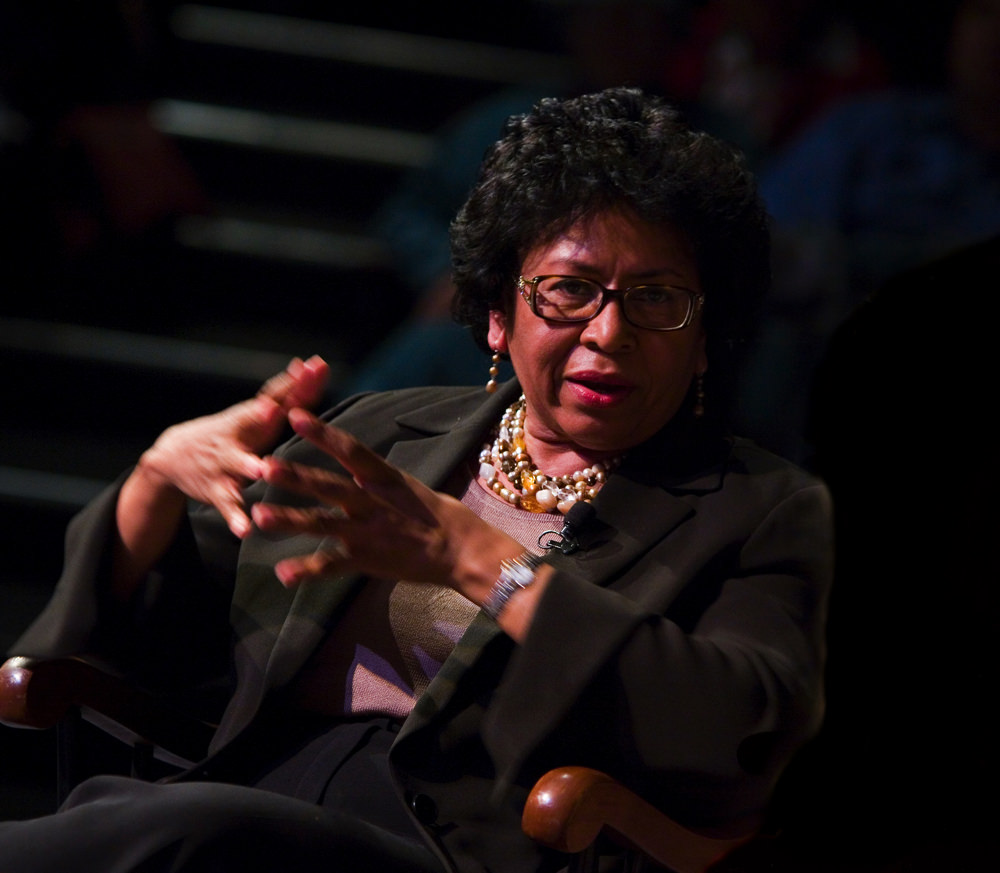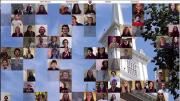President Lawrence S. Bacow informed the community this morning that degree-conferring exercises for the class of 2021 will again be virtual, building upon the experience of the 369th Commencement last spring, after the coronavirus pandemic emptied campus following spring recess. He wrote that “we will gather as a community online on Thursday, May 27, to award degrees and celebrate the achievement of our graduates.” The Harvard Alumni Association previously announced that reunion activities and the business of its annual meeting (the subject of a typical Commencement day’s afternoon exercises) would be held virtually—and a week after the May 27 degree-conferrals that are the focus of the traditional morning exercises.
Among the important points announced today:
• As in 2020, degrees will be conferred in a virtual ceremony.
• The president and deans have promised to hold an in-person ceremony for the classes of 2020 and 2021 at some future time, when public-health conditions permit (and, presumably, when the considerable infrastructure for a Harvard Commencement is in place, at the end of spring semesters, able to do double- or triple-duty). As Bacow put it, “[P]lease know that one day we will welcome the Class of 2020 and the Class of 2021 back to campus for an unforgettable—and unforgettably joyous—Commencement.”
• A guest speaker will again address the graduates, virtually: this year, Ruth J. Simmons, Ph.D. ’73, LL.D. ’02, president emerita of Smith College and Brown University, now president of Prairie View A&M, an historically black university (read more below). Bacow wrote that “She has… defended with great passion the possibility of improving our society by learning from our differences. I very much look forward to hearing her remarks….”
Cross-cutting considerations have shaped the decision to conduct a virtual graduation again. Vaccination against COVID-19 is proceeding. But universal coverage is many months away, with students late in any schedule of eligible populations—and more readily transmissible variants of the coronavirus are spreading rapidly. Given the strict public-health protocols in place on campus, a decision to operate virtually again this spring comes as no real surprise.
On the other hand, there are people around campus this year, as there were not last spring. But although a significant number of undergraduates enrolled this semester, only a small cohort of seniors is in residence. And elsewhere around the University, the business, dental, and medical schools have residential operations and some in-class instruction, but most other professional-school students are not in residence. So hosting an in-person degree ceremony for this year’s graduates would involve either excluding those who are not resident, or inviting those who are absent to travel to Cambridge: ill-advised or, in many cases, likely still impossible come May. (Brown is planning a ceremony for graduates who are in residence, but others eligible for degrees this spring are not allowed to return to Providence.)
Given more time to plan for a virtual ceremony than was afforded during the upheaval in the spring of 2020, it is possible that some more extensive online version of the traditional exercises may be arranged, but those details are not yet available.
• The online event last year featured two of the traditional student parts (the undergraduate and graduate English speakers), but not the Latin salutatorian, so a precedent has been established for incorporating those venerable highlights.
• It is unlikely that there would be a Phi Beta Kappa literary exercise this spring, given the important roles of the guest orator and poet and the presence of the student honorands.
• But it is certainly conceivable that the College might conduct some sort of baccalaureate, and it seems likely that class days (mounted by several professional schools, with guest speakers, last year) will be held in some virtual form again. Updated April 26, 3:20 p.m.: In a message to students, Harvard College dean Rakesh Khurana announced plans to “offer virtual programming throughout the spring to celebrate your journey and graduation, including Baccalaureate, Class Day Exercises, and House ceremonies” (italics added). Thus a baccalaureate and House celebrations (see next item, below) are in the offing.
• After the University degree ceremony, the schools will host their own conferrals again (Bacow wrote that following the University ceremony, “each School at Harvard will follow up with its own special virtual event and afterward deliver diplomas through the mail”). There is no word yet on whether the undergraduate Houses might do something virtual for their dispersed communities of seniors.
• Finally, Harvard has historically insisted that honorary degrees be conferred in person, and so there were none last year (although honorand-designate and guest speaker Marty Baron, executive editor of The Washington Post, did make his address as part of the virtual event, speaking about threat to society of efforts to disseminate misinformation deliberately and the importance of journalism at a time when it has been under political attack). As of this writing, it is unknown whether the University will hew to its traditional practice or try to find some way to present degrees to the would-have-been honorands of 2020 (and/or others) in this year’s virtual graduation.
The Guest Speaker

Ruth J. Simmons during a 2007 Harvard panel discussion among women Ivy League presidents (including president-designate Drew Gilpin Faust)
Courtesy Harvard University
Simmons has, by life experience and professional interest, focused attention on many concerns important to the University today. When she received an honorary degree in 2002, shortly after becoming the first African American president of an Ivy League school, it was noted that she had been born in Grapeland, Texas, the twelfth child of sharecroppers and the great-great-granddaughter of slaves. The citation accompanying her Doctor of Laws degree read: Opening minds, opening doors, opening eyes to new opportunities, she has spurred higher education higher with inspiring providence. (She received the Graduate School of Arts and Sciences’ Centennial Medal, its highest honor, in 1997.)
At Brown, Simmons worked hard to secure funds to move toward need-blind admission, and initiated a pioneering investigation of the institution’s founding roots in the slave trade, culminating in the release of “Slavery and Justice,” the report of the Brown University Steering Committee on Slavery and Justice. That work has been echoed by other institutions’ similar inquiries into their connections to slavery, including the current efforts at Harvard. An important conference held as part of Harvard’s self-examination of its slave connections, reported here, reflects the foundational role the Brown effort, spurred by Simmons, has played.
In 2007, then-Radcliffe Institute dean Drew Gilpin Faust convened a panel of women Ivy presidents to discuss their experiences—only to be named one, herself, by the time the event took place. When asked if there were a female leadership style particularly suited to academic institutions, Simmons declared that idea “nonsense.” Asked about the biggest issues their institutions faced, she highlighted the deplorable state of K-12 education in this country and the stunting effect that has on most students and on society as a whole. That commitment to education carried over into her retirement and unexpected retirement career: the assumption of the Prairie View presidency, focusing on students working hard to gain important knowledge and skills in the A&M system. She has thus lead a women’s college, a research university, and a public university dedicated to serving a highly diverse student body.
Simmons’s Harvard ties of course extend back to her doctoral studies. As Phi Beta Kappa orator in 2003, she spoke of finding herself by losing herself in the study of French literature, of shaping an interior world where she would be free of segregation. At a moment when Harvard, like other institutions, is grappling with its history, racial justice, and broader issues of inequity and educational access, inviting Simmons back to the campus where she committed herself to a life in the academy seems especially fitting. Read the University announcement about Simmons here.
Check back at harvardmagazine.com for more information as it becomes available. Updates will be published by the Commencement Office as well.
The full text of President Bacow’s message follows.
Dear Members of the Harvard Community,
I write today to announce that we will gather as a community online on Thursday, May 27, to award degrees and celebrate the achievements of our graduates. After degrees are conferred, each School at Harvard will follow up with its own special virtual event and afterward deliver diplomas through the mail. More details will be shared by the Commencement Office as they become available.
The delay of our Commencement Exercises for two years running is deeply disappointing, but public health and safety must continue to take precedence. Though circumstances may well improve by spring, it takes months of planning to prepare for our usual festivities, which draw to campus and to Cambridge thousands of people from around the world. Right now, the risk posed by that possibility is too great, but please know that one day we will welcome the Class of 2020 and the Class of 2021 back to campus for an unforgettable—and unforgettably joyous—Commencement.
Fortunately, we learned last year that a virtual celebration can be meaningful and moving in its own ways. I am delighted to announce that Ruth Simmons will deliver our principal address. President Simmons—now at Prairie View A&M University after serving as president at both Smith College and Brown University—is among America’s foremost advocates for higher education. Having led a women’s college, an Ivy League research university, and a historically black university, she has a unique perspective on how very different types of institutions contribute to the fabric of our nation. She has also defended with great passion the possibility of improving our society by learning from our differences. I very much look forward to hearing her remarks later this year.
Thank you, as always, for your goodwill and patience as we continue to meet the challenges created by the pandemic. We are fortunate that it is now possible to imagine the day our graduates will file into Tercentenary Theatre once again, lifted by long-awaited applause in the good company of their family and friends. Until then, keep hope and take care.
All the best,
Larry









